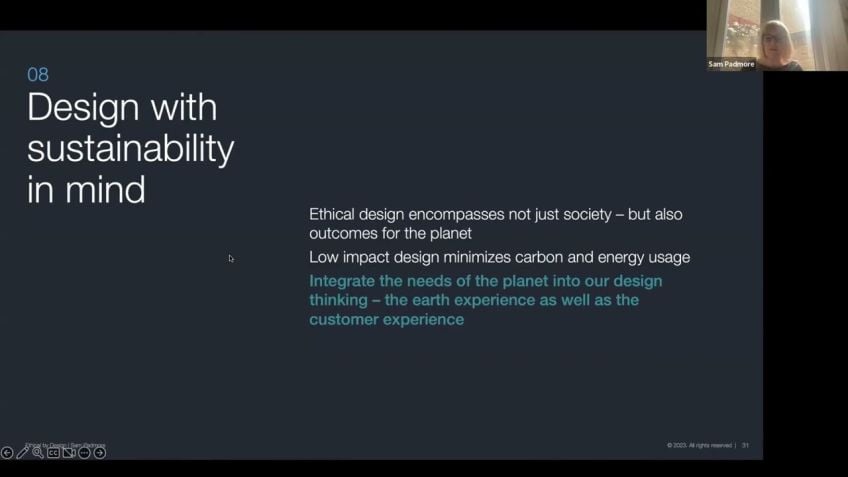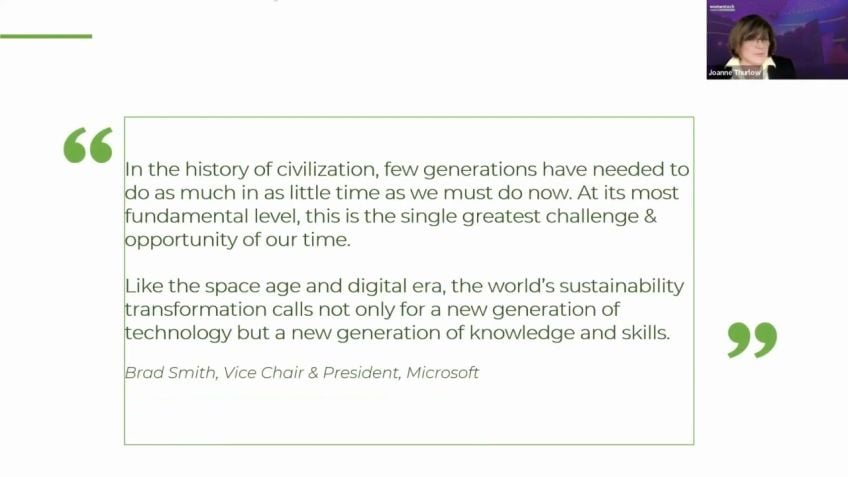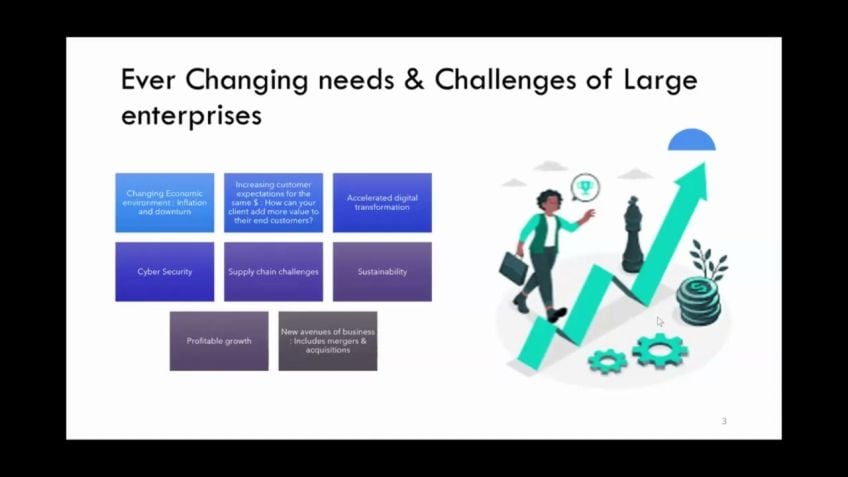How to turn your Sustainability Report a real page turner? by Tuuli-Anna Tiuttu
Embracing Sustainability Reporting for a Better Future
Today, companies worldwide recognize the need for sustainability. However, adopting sustainable practices goes beyond implementing low-carbon technologies and designing out waste in production processes. It requires dedication and commitment to consistent actions that accumulate to make a significant impact. In this article, we'll discuss why it's crucial for businesses to report on sustainability, the key elements of sustainability reporting, and the steps to create a credible, transparent, and comparable sustainability report.
Why Report on Sustainability?
The recently intensified focus on sustainability makes regular reporting on sustainable practices and impact essential for businesses. Implementing a change towards a more sustainable approach can seem like a marathon - it doesn't happen overnight. It requires consistent action, dedication, and motivation.
The Power of Purpose
“Start by figuring out your purpose first, make that very crystal clear so that everyone in your business has a clear understanding of why your company is doing what it is doing in terms of sustainability,” says Tulia Natu, Co-founder and CEO at SDT Monitor. Goals need to be broken down into measurable actions to clearly convey the company's sustainability role and efforts.
External Triggers: Often, a change towards sustainability can be triggered by requirements from external bodies, such as governmental policies or investor preferences.
Internal Triggers: Alternatively, a business might adopt more sustainable practices because they see tangible business opportunities or to maintain trust with crucial clients; they may adopt sustainability because it aligns with their values or because they want to stay ahead and be perceived as a future smart business.
Key Elements of Sustainability Reporting
A quality sustainability report should be credible, transparent, and comparable.
Credibility: It should be based on a known framework and should convincingly show commitment to sustainability.
Transparency: This includes presenting the actual performance, revealing both the positive and negative aspects.
Comparability: A report should offer insights into how a company's practices, efforts, and impacts compare to competitors.
Steps to Creating a Quality Sustainability Report
On the Road to Sustainable Business Growth
Sustainability reporting isn't just about ticking boxes and meeting regulations - it's about demonstrating your business's commitment to making the world more sustainable. Start somewhere, take small actions, and you'll find your business growing in ways that benefit both the planet and your bottom line. As this transformation is not a sprint, but a marathon, where consistency and commitment pay off.
If you're embarking on your sustainability journey or improving your reporting practices, know that every effort matters. With robust, genuine, and quality reporting, you can make your business a part of the shift toward a more sustainable world.
Video Transcription
So, hello everyone and greetings from Sunny Finland today. My name is uh Tulia Natu. I am co-founder and CEO at the sustainability tech start up SDT monitor. And uh this is actually my second time that I'm joining the Women Tech Networks Global Conference.And uh I'm very excited to join again, this amazing group of inspiring and motivational speakers as well as all the participants all over the world. As you may have a guest from our company name, uh the SDGS. Uh These are the United Nations Sustainable Development Goals. They form the main framework of our cloud based sustainability measurements as to um and this also helps companies and organizations to measure manage and communicate their sustainability performance and also to show its SDG as well as environment, social and governance impacts. We are at the set monitor.
What we also do that we help companies and organizations becoming more sustainable. So we help them to draw their sustainability action plans uh to all start from uh finding the suitable key performance indicators, the KPIS for their actions. And then we quantify also the SDGS and make communication plans for transparent, efficient uh communication of their performance. We have only this one planet earth and uh its resilience to CO2 emissions. The overuse of energy, the fossil energies, the level of pollution and waste is totally overly unsustainable.
But we see a global will for bigger transform more transformation. Also known as the change of paradigm. This change of mindset is real and it is necessary we need definitely to change how we think how we do business, how we are producing and consuming products and services and start taking a shorter term approach to sustainability and not to only place uh goals, sustainability goals.
Those magical years of uh 2040 2050 2060 this doesn't make any change. We need to take action right now to reach those goals. And here companies and organizations play a crucial role in this transformation as they keep the economy running and they produce the products and services that we consume. Uh so that there is a growing importance for companies and organizations to set clearer goals and and break them down into measurable actions and start showing also their est environment also and governance impacts by measuring the performance using quantitative data. So in other words, showing all the time where they are at in their sustainability actions and journeys against their goals at any given moment. And so that they will uh stay on top of their sustainability agendas and businesses should not try to do absolutely, should not try to do everything at once. But instead start somewhere and take smaller actions that let them stay motivated while hitting their targets, upgrading goals, reaching even more ambitious uh sustainability targets in the long term.
And having said that in this talk, I will introduce you to the business, sustainability and reporting on non financial matters, the sustainability matters as a result of making this world a better place for people on the planet, but also becoming a future smart business. So it's about how we generate a long term economic growth and enhance social well being without harming the environment. I'm gonna cover uh three key takeaways. Why companies report on sustainability? What are the key elements uh of sustainability reporting? And what are the main steps for creating a credible, transparent and comparable sustainability report? So why companies report on sustainability? Why it's important changing business practices to be more sustainable starts from inside out? So businesses can make use of of course like circular operations that design out waste in the production process or maybe some low carbon technologies that help to reduce the amount of energy used in the first place. So implementing the change is not a sprint, but the marathon.
As you can imagine, training for a marathon race does not happen overnight. If you are a beginner, it requires consistent work, dedication, motivation, staying motivated and daily, weekly actions that creates your performance. So record your marathon training agenda as your sustainability actions that you are taking in the short term and the completed marathon race as your long term actions that you have achieved the um you probably all know Simon XX uh best selling book start with why he's using this golden cycle in this book.
Uh explaining uh that companies know what they do, but only some of them know how they do what they do. But surprisingly, only very few companies know why they do what they do, where why is representing the business purpose. So now for anyone out there starting a sustainability journey and starting the reporting start by figuring out your purpose first, make that very crystal clear so that everyone in your business has a clear understanding why your company is doing what it is doing in terms of sustainability and what are the desired outcomes your actions uh take.
So in practice, we just need to set more clearer goals as companies and break them down into measurable concrete actions so that everyone knows what to do and what is their role in it with everyone? I mean, absolutely everyone. So also that back office person may be handling some big amounts of digital waste, knows their role in the big sustainability picture of the company. So now let's look at this pyramid um of mass and well, and I'm gonna go from bottom up so often, the trigger is a must or requirement that is imposed by you on you by an external body um such as the government or your investor and it forces you to react. Uh An example of this could be uh China's low carbon policy that promises to reduce the carbon emission intensity to 60 to 65% of 2005 levels and achieve peak carbon emissions by 2030 then carbon neutrality by 2060 the policy forces um Chinese uh companies to align their sustainability actions with government goals in Europe.
On the other hand, the corporate sustainability reporting directive, the CS RD is coming into force next year 2023 and sets the standard by which nearly 50,000 companies in the EU will have to report their non financial climate and environmental impacts. So all companies in eu um area including foreign companies that have presence in the eu meeting at least two or three criteria out of the following have to comply. So companies that have 40 million in net turnover and 20 million in assets or 250 or more employees. The this framework, this directive CS RD makes sustainability reporting more coherent by form and also comparable from one company to another. Uh what the company must report will be standardized, disclosed in digital format and increase companies accountability to watch their stakeholders, investors, clients owners.
But then also sustainability can come as a requirement from your biggest client. This is the client that you don't and you cannot afford to lose uh or your investor who may be requires that you provide a certain form of sustainability data or good business opportunities or innovation can work as a trigger to your company. Uh It can be maybe beneficial to change your business model from linear to circular uh to get more clients um or a market share um and get a competitive advantage, stronger employer image through these sustainable practices. Or then the company simply finds. So the highest level of the param the company simply finds sustainability elementary for them. It knows that it's the only way to do business at uh today. Uh So they are looking forward to be future smart business. So the must is not imposed from ex ex uh from exterior but it's imposed by yourself. Then let's look at the key elements of sustainability reporting. Also, now I want to say that if you want to use the chat for questions, you're very welcome to do so. So when you write your sustainability report, think about what makes it credible, transparent and comparable here.
I refer with credibility um to the in the report so that it proves that you are doing something based on a framework you are using, for example, different CO2 calculators uh certificate standards such as the TR I SAS piso, maybe you have signed the Global Compact of United Nations to if you are supporting that S tt the Sustainable Development Goals, et cetera, then you have the transparency.
So in system api reporting, it's as important as credibility. Transparency in this context refers to how you are doing your reporting. It means that how you present your actual performance and also you show those ne negative numbers. Uh So you are saying which data is good or bad in your report comparability reflects your performance again against your competitors. Uh And one way to measure this is by using industry specific KPIS. And you can find this by uh viewing and searching from general associations and trade organizations. They gather a lot of data, you can ask your peers and competitors because they probably are struggling with the same challenge or then go through legal frameworks such such as eu taxonomy, CS RD. There's a lot of very valuable guidance out there. So when you write your report, uh choose a known framework to increase credibility, show your bad numbers uh to increase transparency and then choose industry specific KPIS to ensure that your report is comparable with other companies in your industry. Then the main steps for creating a sustainability report.
So uh here we have identified what we think are the eight main steps for creating a transparent, credible and comparable sustainability report. And it all starts from writing a clear structure. So your sustainability report needs a clear structure. You should allocate enough time here to define the structure, what you, what you wanted to, what you want to include in the report. So be here very specific and short, you might also want to use some word counts uh on the different sections of your report, always keep the focus on your readers. So what do they want to get out of your report? These are the people reading the report. So your internal and external stakeholders make sure also that the information is easily found from the report. Use colors and icons maybe to highlight some sections and pay attention to the length. So my advice is to you that don't write, write 100 50 page manual, but rather a concise 50 page report that serves all your stakeholders. Um Next step is the purpose of sustainability. So, so like we, I just talked about the purpose, how important it's to write down the narrative of sustainability for your company. What it means to you, why you do what you do in terms of sustainability and make everybody inside the company to understand that.
So define the sustainability. Why it's important to your company present the value proposition to your stakeholders also what challenges in terms of sustainability your company faces and what positive uh uh impact it creates. This can be executed, for example, writing a foreword, uh the sustainability narrative or maybe a letter from the CEO at the beginning of the sustainability report, then your past year in one page. So one thing to very important thing to include into the sustainability report is a one pager where you summarize the past year in one page because the annual reporting always looks back and presents all the highlights the cha the changes, the results of your previous year for your stakeholders.
So include also external implications into this one picture. For example, now that we have been living in the COVID 19 world since the last 2.5 years, maybe the war in Ukraine might have affected somehow to your business legislation, changes trade practices or or maybe changes in the organizational structures. So you can include all that into the one picture which is basically an infographic, including key figures, tables, uh images. For example, then the fourth step is the ESG team. So I suggest you to categorize your content into the environment that social and governance teams.
And uh and why? Because so many reporting already uses this and investors, for example, they are looking at the uh EFC impact of the businesses. So these stakeholders are already have a habit to read reports which is categorized into the ESC you can use here here as well. Uh colors to identify each of the ESNG infographics and maybe put some case studies for to build more structure into the report. Then you have the short and long term goals, present your actions, present all of the sustainability actions that you are taking and you took and your KPIS and the timeline to show what you did specifically last year to reach your goals and visualize these timelines, maybe use the same visualization from one year to the next, just updating the arts from, from the last year's report to this one, this year's report.
And, and that way also you are uh teaching the stakeholder to read similar kind of data and a presentation from your part, data and performance. Uh presenting quantitative data is elementary for credible reporting, so justify and validate it, explaining what the numbers mean.
So where do they come from? Are they good or bad? And point out where are you on track, maybe ahead stagnating, leaving behind uh towards your targets. And here you can also use different dashboards to visualize it better and clearer to your stakeholder and the reader seven step.
Very important. No cream washing. So don't be scared to report your challenges and failures as well. Not only put, not, don't put only the positive outcomes into the report, avoid exaggeration and using buzzwords without concrete meaning. So if you use some buzzwords always explain what is the content with them within them uh for you and your business be specific. Uh And yeah, that strengthens the transparency and trust among your among the readers and stakeholders of your company. The eighth step is of course communication.
You have your reports ready now use the report's content all year round in social media channels, your newsletters and all the other communication channels that you might be using cut and share parts from it. Also share parts from the report on your uh website as well. Make also the PDF link very easy to get found. Don't put too many clicks uh to uh annoy the person who is trying to find your society with the report on your website, make it easily to get found and divide also those sections to um on your website, easily to be read and understood and found. But you can also use some creativity and reader friendliness uh when you are communicating your content. So now I wanted to uh end uh end this speech about uh how to make the sustainability reporting process easy. So of course, measuring of performance consistently daily, weekly monthly manner makes it much more easier. There is no panic mode right before uh um creating the report, use a tool where you are collecting your sustainability data and monitor the progress regularly. So now do you have, does anyone have any question? I would be very happy to happy to answer uh to you here on life uh question from Jan. How prepared do you think companies are? Um Absolutely.
This is something what we are also uh how, how do we help companies is that we really start from the beginning for many of our clients to, to help them to create their sustainability action plans. So they are starting from the beginning, they are not really sure where to start, but we use a very, very uh concrete um steps to, to make this happen and make those first. Action ready because you can always upgrade afterwards. You just have to start somewhere and really to find the, um, the, the challenge or the problem where the boat is leaking the most, like we like to say. So where is the boat leaking the most? Take that challenge in hand first. Uh What, what is it in your business or in your industry? And then you can wrap the rest around it and, uh, and bring more actions into it. Uh But in, in general, definitely there are companies are in very different stages at the moment, we are um working uh mostly currently with European companies. So uh so, uh so, so there are uh very vast uh division and uh of different stages. So we are supporting um SME S and also uh also bigger companies as well as micro companies. So very, very uh many, many uh sizes of businesses from several industries. And uh so thank you. Thank you so much, Joan for your question.
So a couple of very good sustainability reports if you would like to check are, for example, uh decathlons uh sustainability report. Uh uh It's a Decathlon is a French sporting goods manufacturing company. And also it has a very good sustainability reports if you want to look at the structure uh stg alignment, the est themes, et cetera, so very, very well done. And also all the data is always presented in a very um user friendly and um way, reader friendly way. Yes. OK. So now we are starting to uh get um the time is ending. So what I wanted to say at the end, um really uh start to educate, educate yourself if you are willing to take the sustainability career further in your, in your uh profession and what you are doing currently, educate yourself, read things about what you are interested in or do.
Like I did, I took a lot of evening courses while I was still working at the OECD before starting S TT monitor. And uh yeah, so thank you so much for coming to my session. I hope I have inspired you uh to creating your sustainability report. Reach out to me through linkedin or, or direct mail and uh I would love to hear from you. So let's keep in touch. Thank you so much and have a great day.





